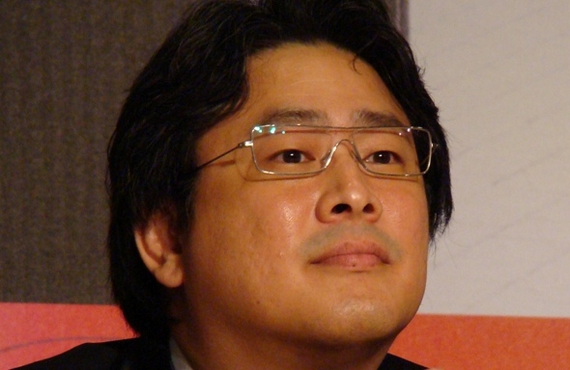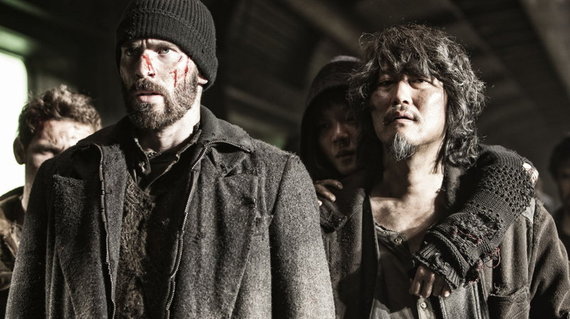
The Producers' Work is an experiment created for the sole purposes of this blog. We want to take a closer look at the producers working in different areas of the art and entertainment industry. Why? Mainly because we are curious! These powerful and yet mysterious personalities are strongly mythologized by the society. We would like to know more.
Who are they?
What do they do?
What responsibilities do they have?
We do know that the producers are a group of outstanding, creative and charismatic personalities. That is why we would like to introduce to you The Producer's Work!
We would like to welcome Park Chan-wook, director of cult classic Oldboy and producer of Snowpiercer which recently came out on Blu-Ray and DVD.

Park Chan-wook © Masha Kuvshinova [CC-BY-3.0 (http://creativecommons.org/licenses/by/3.0)], Wikimedia Commons
Przemyslaw Dobrzynski: Why have you decided to get involved with the production of the Snowpiercer movie as a producer?
Park Chan-wook: It was already some time ago, when I started my own production company. I've met with director Bong Joon-ho, who is my close friend and he asked me if we would do something together. At that stage, Bong had planned to start with two projects, the first was Mother, and the second was the Snowpiercer. He asked me, in which of the two I would like to get involved, and, being a fan of science fiction, I was much more interested in Snowpiercer. I got into the hands of graphic novel Le Transperceneige, on which the movie is based, and then decided to bring it to the big screen.
P. D.: Why did you cast Chris Evans in the leading role? He is associated with some other type of productions, and physically he's almost the embodiment of the typical American Boy.
P.C.: Chris has been willing to work on some serious project for a long time. He is now at the point of his career, which generates fears that the role of the Captain America may cling to him permanently. On the other hand, his current position provides a great amount of freedom about choosing out of next proposals that are being sent to him. We were impressed by his determination to do something that differs from his current resume. In addition, he was familiar with all of the films, director Bong Joon-ho did in the past, so we knew that Chris knows what he wants and that he is aware of what he is signing for.
Marcin J. Sobczak: Have you seen Chris in Captain America before the casting?
P.C.: No, I have not seen this film, but I watched The Avengers and I really liked it.
P.D.: You mentioned that you are a big fan of science-fiction movies. What are your favorites?
P.C.: I love science fiction as a genre, not just in film, but mostly in books to be honest. What's more, I believe that cinema is not able to compete with the sci-fi literature at any level. That being said, for me, the best film of this genre has always been the Blade Runner by Ridley Scott.
P.D.: Were you inspired by this film while working on Snowpiercer?
P.C.: At some point I certainly thought about the original Planet of the Apes in the context of the strong cliffhanger at the end. On the other hand, in the case of Namgoong Minsu character I was thinking about some similarities between him and Han Solo from Star Wars. He is not the main character, but it's not a supporting role either. And if we are talking about the action of the film, sealed in a narrow, confined space, the obvious inspiration was Alien if I would have to compare it to something.
P.D.: For a time you worked as a film critic. Don't you miss that?
P.C.: No, not at all. But not because it was a bad job or something like that. I just always wanted to be a director. My first films weren't successful, so I was forced to seek other work which would, temporarily, allow me to make a living. So I started working as a film critic. However, it was not a free choice I wanted to make myself, but rather a necessity, and that's why I do not miss it too much.
M.J.S.: As a director and producer at the same time, tell me, why the brutal violence, so often associated with Korean cinema, meets with greater tolerance of the audience in your country than in other parts of the world?
P.C.: It's not quite as you're saying. It's a strange phenomenon, that of all the movies that are created in Korea, the international disturbance is given to those containing a huge dose of violence. And they are neither numerous nor have any great successes in our cinemas. I do not think that Korean audiences are more tolerant towards violence than the rest of the world. Just looking at the box office in Korea, we see that the most successful films are comedies - movies that entertain. Violent films are quite niche, really.
M.J.S.: You had the opportunity to work on film sets in both Korea and America. I remember that one time you used a quote from Ang Lee who said that: "In Asia, the director is a king, and in America - a president."
P.C.: This is due to the different work ethos and how it is perceived in this two countries. In Korea director really is like a king, he has a decisive opinion on any matter concerning the film and also determines how it will look in the final stage. In the United States, the director is often regarded as one of the artisans, who reports directly to the producers. Obviously this is not always the case, but it seems to me that in Asian cinema both parties are more willing to compromise.
P.D.: You have achieved a lot in the international arena. What did you learn doing your debut in Hollywood with Stoker?
P.C.: Gearing up to my English-language debut in Hollywood I did not expect anything great, on the contrary, I wanted to do something very inconspicuous and ephemeral. In all my previous films, the only level where I hit on the linguistic or cultural barrier between diverse audience from around the world was the humor. Creating an English-language film finally gave me a chance to try to reach a Western audience, which this time will understand all the funny scenes that I had in mind. Of course, in a movie such as Stoker, which is quite dark thriller, there are not too many funny moments, but for me, as an artist, there is nothing more frustrating than a situation in which the audience does not understand all my intentions.
Still from Snowpiercer. Courtesy of Radius TWC
M.J.S.: Watching your previous films: Old Boy, Lady Vengeance and most recently Stoker, it is easy to conclude that you're attracted by dark stories, which, however, are beautifully filmed. Why do you think this type of dichotomy is important in your own storytelling?
P.C.: Despite the fact that I live a very quiet and peaceful life, without any major problems, I'm always interested in finding the other "me", who craves more negative emotions such as revenge or jealousy. This "dark half", hidden somewhere inside me, stimulates me to reflect on how to take it with me. One of the reasons why I make this type of films is probably self-analysing this phenomenon of my own personality. And if I want to be interested in including a wider audience, I want to show it in a beautiful, for no one would be interested to look at ugly and horrible images. When something repulsive and dark is shown in a beautiful way, then we have to deal with irony. Then we can easily take care of discovering the complexity of the human nature.
P.D.: Your main characters are not only men but sometimes also women. How do you manage to come into their psyche and reliably show them on screen so that the audience sympathize with them?
P.C.: It is said that every person has a masculine and feminine side of personality. I'm not a woman, but in such cases I try to wake up this feminine element within me. Aside of that I have a daughter who is the same age as the character played by Mia Wasikowska in the movie Stoker. It was also one of the reasons why I became involved in this project. Above all, I draw the handful of conversations with my wife - most of my inspirations come directly from my conversations with her.
M.J.S.: Have you seen remake of your own Oldboy, directed by Spike Lee?
P.C.: No, I have not seen it yet. When it appeared in theaters in Korea I've been too busy working on Snowpiercer. But I'm really curious and want to see it sometime in the nearest future on the DVD.
This interview was made and written by Przemyslaw Dobrzynski, Marcin J. Sobczak and Bruno Lekki.

